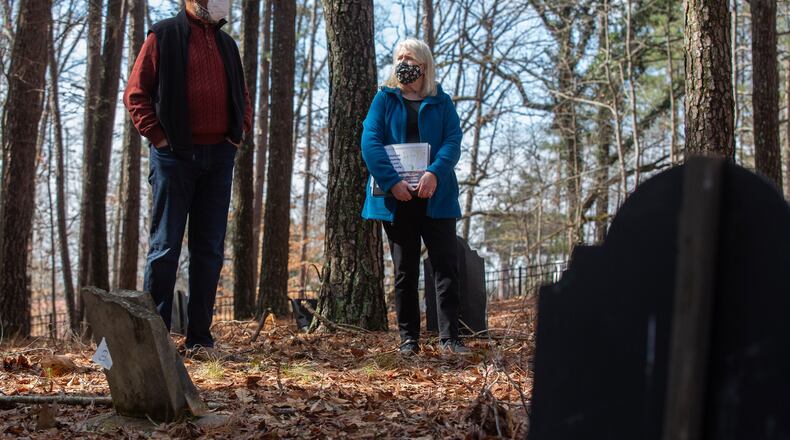Johns Creek plans to hire an expert to advise the city on improvements to Macedonia African Methodist Church Cemetery, which is in disrepair.
The city has designated $100,000 in its current budget to enhance the historically Black cemetery where at least eight graves are those of people born into enslavement. Spending beyond that amount would have to be approved by City Council.
During a Monday work session, City Council agreed to have the city manager’s office hire an expert to advise staff and get started on repairs such as removing trees that are at risk of falling and damaging headstones.
Assistant City Manager Kimberly Greer told councilmembers that an expert in historic preservation and cemetery maintenance is needed. The city has had to deny requests for short-term improvements to the cemetery because staff doesn’t have experience in those areas, she said.
“Staff has already begun reaching out to a number of experts to gauge their interest and availability to assisting with the project,” Johns Creek spokeswoman Edie Damann said via email Thursday.
Some residents have expressed concern that the city would exclude community input on enhancing the cemetery and delay repairs. Mayor John Bradberry and City Council members have said they want the community involved in future cemetery plans.
“Everyone is committed to keeping the cemetery as serene as possible and a place for reflection,” Bradberry said Thursday.
Macedonia is a nearly two-acre site, located in a quiet space at the top of a hill and just a few yards from busy Medlock Bridge Road.
City Council agreed to purchase the cemetery in 2020 through eminent domain when the property owner was unknown. The land was originally owned by George Morgan Waters, who owned at least 100 slaves, Johns Creek Historical Society members say.
Records from now-defunct Milton County show the property was sold in 1905 to Black residents for a church. The church building is no longer there
There are 24 marked graves and at least 110 unmarked graves at the cemetery, Joan Compton, co-founder of the historical society has said.
During Monday’s meeting, Councilman Larry DiBiase suggested the city form a foundation for the cemetery. That would allow residents and others long-committed to research and minor repairs to serve as advisors, and allow for the possibility of donations, he told The Atlanta Journal-Constitution Thursday.
“There are donors and foundations to protect Black history that we could potentially get donations from,” DiBiase said. “Otherwise the cemetery will have to depend on (city) budgets, which can change.”
About the Author
The Latest
Featured



